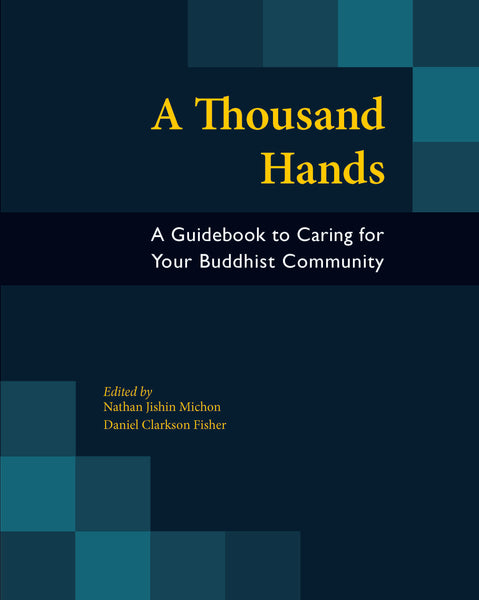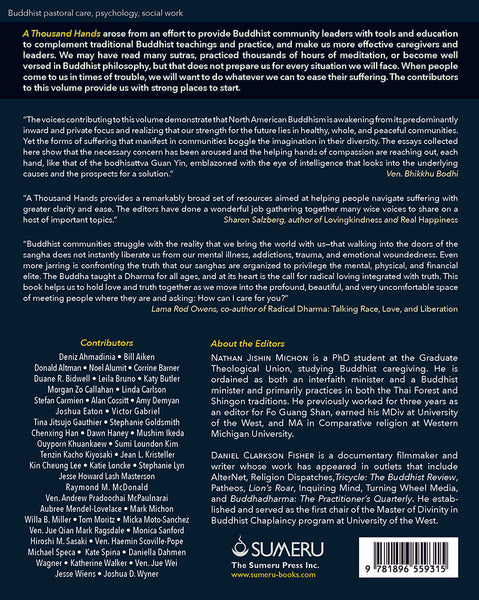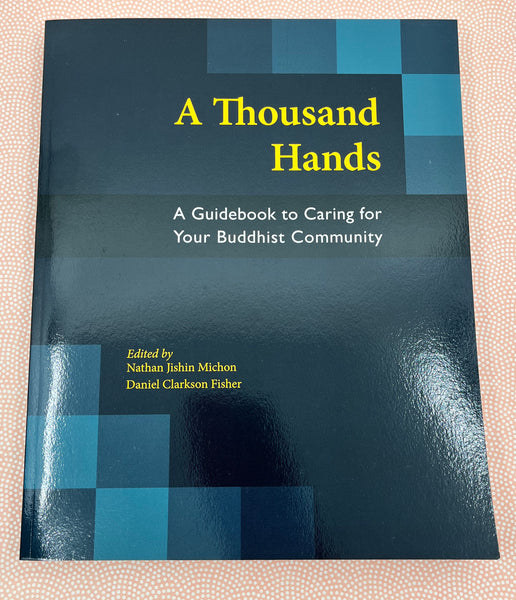A Thousand Hands: A Guidebook to Caring for Your Buddhist Community
ISBN 978-1-896559-31-5
384 pages, paperback, 8 x 10 inches
Buddhist pastoral care, Psychology, Social work
A THOUSAND HANDS: A Guidebook to Caring for Your Buddhist Community
Nathan Jishin Michon + Daniel Clarkson Fisher, EditorsPreface by Daijaku Kinst, PhD
Avalokitesvara is a great bodhisattva from the Mahayana tradition who embodies the ideals of compassionate interaction. The East Asian translation of the name, ‘Guan Yin’ (Jp. Kannon; Kr. Kuaneum), reflects this compassion as the characters translate roughly to “one who perceives the cries [of the world].” In one of the many forms in which she is represented, Guan Yin is shown with one thousand eyes and one thousand arms, so that she/he may not only see and be aware of all the forms of suffering in the world, but also have the means to skillfully help in a way that fits each individual’s needs.
This book arose from a yearning to work towards that goal among monastics and other leaders in Buddhist communities. In our experience at University of West—about as diverse a Buddhist environment as one can find, with ordained and lay students from numerous countries and traditions filling the classrooms and walking the hallways—we often encountered people who asked what was taught in all those M.Div. classes. When hearing about some of the chaplaincy training, nearly all of them either told a story of how they could have used such training or described how they really wished such aspects were included as a part of Buddhist monastic/leadership training in general.
As a Buddhist community leader—or even a concerned community member—we may have read many sutras, practiced thousands of hours of meditation, or become well versed in Buddhist philosophy, but that does not prepare us for every situation we will face. It is very natural that people turn to a spiritual or religious community in times of trouble, and when such a person comes our hearts may fill with compassion and want to do whatever we can to ease their suffering. However, our beautifully diverse world also brings forth a countless array of problematic situations. One individual may struggle with clinical depression. Another might have serious financial hardships. Or maybe we are wondering how to best get the children and youth in our community more involved. Abrahamic training in the West includes many of these aspects and there are plenty of books from Abrahamic perspectives which help accentuate that knowledge in various ways. However, conversations with Buddhists in the West show that both such training and resources are often lacking.
Of course, this book will not provide all the answers you need for every situation. It is simply one guidebook; it is a beginning, created from many of the issues we heard people struggling with in their communities, inspired by the compassion of so many wonderful hearts caring for others around them. This book simply aims to provide some brief passages of guidance on how to handle issues, necessary background information, practical tips on what you can do, and information about further resources. There were so many topics to include and cover, and, unfortunately, we could not make this book encompass everything. There are other issues we had hoped to include but that did not make it into the present work for various reasons (e.g., sleep disorders, chronic pain, creating a social media presence for your community, crisis caregiving, creating and managing youth groups, etc.). It is our hope that this volume will not be the one and only resource, but the just the beginning.
CONTENTS
Part I – Working with Ourselves
1 Ministry of Presence, Micka Moto-Sanchez2 Listening as Spiritual Care, Willa B. Miller
3 Nonviolent Communication, Jesse Wiens
4 Understanding Our Own Power & Privilege, Mushim Ikeda
5 Creating and Managing Budgets, Venerable Jue Qian
6 Practical Buddhist Theology, Monica Sanford
Part II – Working with Others
7 Sickness and Hospital Visitation, Tina Jitsujo Gauthier8 AIDS and STDs, Noel Alumit
9 Cancer, Michael Speca, PsyD & Linda Carlson, PhD
10 Hospice Ven. Andrew Pradoochai McPaulnarai & Morgan Zo Callahan
11 Alzheimer’s and Other Dementias Deniz Ahmadinia, MMFT, & Corrine Barner, MA
12 Older Parent Care & Degenerative Disease, Katherine Walker
13 Grief and Bereavement, Tenzin Kacho Kiyosaki
14 Balancing Personal Finances, Mark Michon
15 Depression, Alan Cossitt
16 Suicide Intervention in Buddhist Contexts, Duane R. Bidwell
17 Family Systems, Jesse Howard Lash Masterson
18 Military Families, Raymond M. McDonald
19 Trauma and PTSD, Daniella Dahmen Wagner, MMFTI
20 Multigenerational Trauma, Kin Cheung (George) Lee
21 ADHD, Mark Ragsdale
22 Autism, Mark Ragsdale
23 Anger Management, Venerable Haemin Scoville-Pope
24 Anxiety Disorders, Joshua D. Wyner
25 Bipolar Disorder, Aubree Mendel, LMFT
26 Schizophrenia, Aubree Mendel, LMFT
27 Eating Disorders, Jean L. Kristeller & Donald Altman
28 Addictions and Substance Abuse, Tom Moritz
29 Compulsive Sexual Behavior, Kate Spina
30 Prisoners and Parolees, Daniel Clarkson Fisher
31 Domestic Violence, Ouyporn Khuankaew
32 Abuse, Amy Demyan & Stephanie Goldsmith
33 Sexual Assault, Dawn Haney
34 Divorce, Stephanie Lyn
35 Acculturation, Hiroshi M. Sasaki & Kin Cheung (George) Lee
36 Young Adult Asian American Identities, Chenxing Han
Part III – Working with Communities
37 Facilitating Groups, Leila Bruno38 Storytelling, Jesse Howard Lash Masterson
39 Engaging and Managing Team Projects, Venerable Jue Wei
40 Dharma Programs for Families with Children, Sumi Loundon Kim
41 Conflict, Nathan Jishin Michon
42 Clergy Misconduct and Abuse, Katy Butler
43 Gender, Stephanie Lyn & Daniel Clarkson Fisher
44 Race, Katie Loncke
45 Sexuality, Victor Gabriel
46 Poverty, Daniel Clarkson Fisher
47 Accessibility, Stefan Carmien
48 Interfaith Considerations, Nathan Jishin Michon
49 Intrafaith Considerations, Bill Aiken
50 Community Outreach & Service Programs, Joshua Eaton
ABOUT THE EDITORS
Nathan Jishin Michon is a PhD student at the Graduate Theological Union, studying Buddhist caregiving. He is ordained as both an interfaith minister and a Buddhist minister and primarily practices in both the Thai forest and Shingon traditions. He previously worked for three years as an editor for Fo Guang Shan, earned his MDiv at University of the West, and MA in Comparative religion at Western Michigan University. Nathan also trained in Peace and Conflict Studies at the European Peace University in Austria and interned at related organizations, such as Peace Action Training and Research Institute of Romania (PATRIR) and Peace Revolution in Thailand.
Daniel Clarkson Fisher is a documentarian and writer whose work has appeared in outlets that include Alter-Net, Religion Dispatches,Tricycle: The Buddhist Review, Patheos, Lion’s Roar, Inquiring Mind, Turning Wheel Media, and Buddhadharma: The Practitioner’s Quarterly. He established and served as the first chair of the Master of Divinity in Buddhist Chaplaincy program at University of the West. In addition, he has served as adjunct faculty for Antioch Education Abroad’s Buddhist Studies program in Bodh Gaya, India, and Adjunct Faculty in Chaplaincy at Hartford Seminary. A dedicated environmental educator, he was trained and certified as a Climate Reality Leader by Former U.S. Vice President Al Gore and the Climate Reality Project in 2012, and completed the Aldo Leopold Foundation’s Land Ethic Leader Program in 2014. He now lives in Toronto, Canada with his wife Stephanie Lyn, who contributed two chapters to this volume. Visit him online at danielclarksonfisher.com.
REVIEWS
“The voices contributing to this volume demonstrate that North American Buddhism is awakening from its predominantly inward and private focus and realizing that our strength for the future lies in healthy, whole, and peaceful communities. Yet the forms of suffering that manifest in communities boggle the imagination in their diversity. The essays collected here show that the necessary concern has been aroused and the helping hands of compassion are reaching out, each hand, like that of the bodhisattva Guan Yin, emblazoned with the eye of intelligence that looks into the underlying causes and the prospects for a solution.” Ven. Bhikkhu Bodhi
“A Thousand Hands provides a remarkably broad set of resources aimed at helping people navigate suffering with greater clarity and ease. The editors have done a wonderful job gathering together many wise voices to share on a host of important topics.” Sharon Salzberg, author of Lovingkindness and Real Happiness
“Buddhist communities struggle with the reality that we bring the world with us—that walking into the doors of the sangha does not instantly liberate us from our mental illness, addictions, trauma, and emotional woundedness. Even more jarring is confronting the truth that our sanghas are organized to privilege the mental, physical, and financial elite. The Buddha taught a Dharma for all ages, and at its heart is the call for radical loving integrated with truth. This book helps us to hold love and truth together as we move into the profound, beautiful, and very uncomfortable space of meeting people where they are and asking: How can I care for you?” Lama Rod Owens, co-author of Radical Dharma: Talking Race, Love, and Liberation
Listen to a conversation about A Thousand Hands on The Secular Buddhist podcast online with Ted Meissner, Nathan Michon and Daniel Fisher...










